
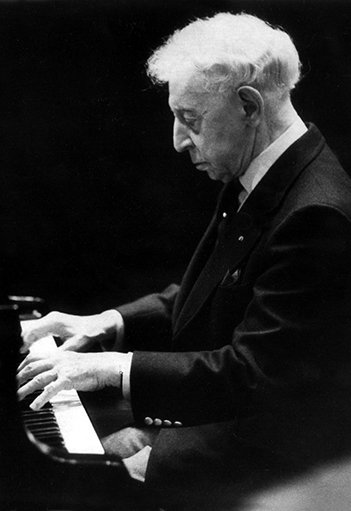
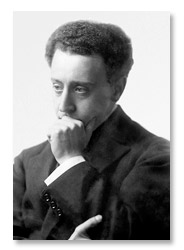
Arthur Rubinstein was the youngest of seven children, the sixth being born eight years before him. His musical talent was evident at a very early age, being musically tested at the age of four at Berlin’s Hochschule für Musik by Joseph Joachim. He was not exploited as a child prodigy, although he gave his first concert at age seven, and after some lessons from local teachers in Łódź and Warsaw returned to Berlin at the age of ten where Joachim supervised his musical training. He studied piano with Heinrich Barth and theory with Max Bruch and Robert Kahn. At twelve Rubinstein made his debut in Berlin playing Mozart’s Piano Concerto in A major K. 488 with Joachim conducting. Over the next few years he continued his education and played concerts in Warsaw, Hamburg and Dresden. The summer of 1903 was spent with Paderewski at his home in Morges and upon his return to Berlin, Rubinstein decided to finish his studies with Barth and go to Paris. His years from ten to seventeen were spent in Berlin, supported by patrons; he hardly ever saw his family.
At his Paris debut Rubinstein played Chopin’s Piano Concerto No. 2 in F minor Op. 21 and Saint-Saëns’s Piano Concerto No. 2 in G minor Op. 22 with the Lamoureux Orchestra and Camille Chevillard. Rubinstein was engaged by the Knabe piano company to tour America, giving forty concerts in three months; his debut was in Carnegie Hall where he played Saint-Saëns Piano Concerto No. 2 in G minor Op. 22 with the Philadelphia Orchestra. By this time Rubinstein had already become popular in high society, and practising new repertoire and studying scores took second place to socialising. He relied on his talent to learn quickly, did not work at technically difficult passages and used the sustaining pedal as a camouflage. Reviews in America were not good, mainly commenting that Rubinstein was inexperienced and unprepared, but was clearly a talent that would mature.
Already living beyond his means, Rubinstein gave piano lessons and played orchestral and opera scores to whoever would pay him. He gave concerts in Poland and Russia and was then sponsored by Prince Lubomirski which enabled him to give concerts in Berlin, Rome, Vienna, Kraków and Lwów. In 1912 Rubinstein played Karol Szymanowski’s Piano Sonata No. 2 in Vienna, Leipzig and Berlin and then gave six concerts in London, some with instrumentalists Pablo Casals and Jacques Thibaud. When he returned to England in 1915 Rubinstein gave twenty concerts with violinist Eugène Ysaÿe. Because he spoke at least five languages, during World War I Rubinstein was based in Paris acting as an interpreter. He then toured Spain and South America, where he was extremely popular. This was the beginning of his lifelong association with the music of Spain.
Once the war was over, Rubinstein continued the life of performer and socialite, but after his marriage, at the age of forty-five, he stopped appearing in public because he was not satisfied with his playing, describing himself as ‘an unfinished pianist who played with dash’. He worked on his technique, studied scores in more detail than before and returned to the concert stage with immediate success, continuing a career well into his eighties. Not simply a solo pianist with a large repertoire, Rubinstein also played chamber music with violinist Jascha Heifetz and cellist Emanuel Feuermann (and later with Gregor Piatigorsky). Rubinstein loved to play the piano and would think nothing of performing two concertos in one concert, even when in his seventies. In the mid-1950s he played seventeen works for piano and orchestra in five concerts, and in 1961, already in his mid-seventies, he played ten recitals at Carnegie Hall. He gave his final recital in London’s Wigmore Hall in June 1976 at the age of eighty-seven. He lived on with failing eyesight until the age of ninety-five, completing two volumes of entertaining autobiography entitled My Young Years (1973) and My Many Years (1980).
Rubinstein’s recording career lasted from 1927 to 1976. He recorded much of his repertoire, including the complete works of Chopin, and many other works more than once, including Beethoven’s piano concertos three times. In 1999 RCA/BMG issued his complete authorised recordings on ninety-four compact discs. From the early years come compelling accounts of Tchaikovsky’s Piano Concerto No. 1 in B flat minor Op. 23 with the London Symphony Orchestra and John Barbirolli made in 1932, and Saint-Saëns’s Piano Concerto No. 2 in G minor Op. 22 with the Orchestre de la Société du Conservatoire and Philippe Gaubert from 1939. The Tchaikovsky is regal and expansive, with drama when needed, but the Saint-Saëns was not issued at the time, perhaps because of a few inaccuracies. It is a wonderfully vibrant and exciting recording of this work, only made available in 1998 by Testament, and then included in the RCA/BMG set. Another highly enjoyable concerto recording is of Beethoven’s Piano Concerto No. 4 in G major Op. 58, a favourite work of Rubinstein. Made in 1947 with the Royal Philharmonic Orchestra and Thomas Beecham it has a buoyancy and character all its own with Rubinstein playing cadenzas by Saint-Saëns.
Rubinstein’s first recording of the complete Chopin mazurkas, made in the late 1930s, has more infectious charm and style than the later recording from the mid-1960s. The 1932 recording of Chopin’s complete scherzos captures Rubinstein before he took himself too seriously, with quicksilver performances caught as if on the wing. Indeed, the 78rpm-era recordings, before editing was possible, are often preferable, as many of the later discs lack a certain spontaneity and sometimes sound as if they were recorded in a vacuum. However, from the LP era comes his greatest recording of Brahms’s Piano Concerto No. 1 in D minor Op. 15 with the Chicago Symphony Orchestra and Fritz Reiner made in 1954. Rubinstein had great stage presence, and although there are few live recordings, a Chopin recital given in Moscow in October 1964 captures the excitement of such an event. When RCA/BMG reissued this they unnecessarily tried to patch a slight memory lapse in the Sonata No. 2 in B flat minor Op. 35. Rubinstein’s series of ten recitals at New York’s Carnegie Hall in 1961 was recorded, and some of the material was issued. Again, we hear Rubinstein where he preferred to be, in the concert hall with an audience, rather than in the recording studio. Here can be found wonderful performances of works by Debussy, Villa-Lobos, Szymanowski and Schumann.
Of his chamber music recordings, those with violinist Jascha Heifetz and cellist Gregor Piatigorsky are the finest. They were popularly known as The Million Dollar Trio, and their recordings of piano trios by Tchaikovsky, Ravel and Mendelssohn are particularly fine.
© Naxos Rights International Ltd. — Jonathan Summers (A–Z of Pianists, Naxos 8.558107–10).
| Title | |
| BRAHMS, J.: Piano Concerto No. 1 in D minor, Op. 15 (Rubinstein, Haitink) | |
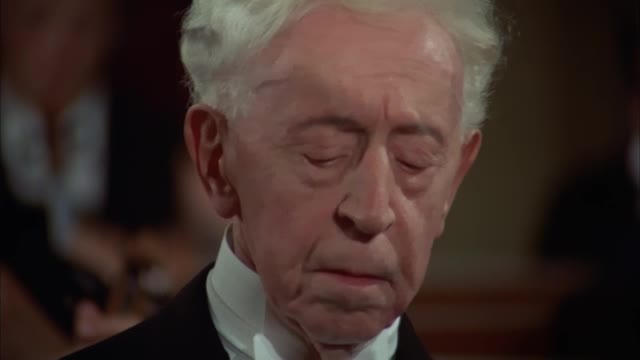
|
BRAHMS, J.: Piano Concerto No. 1 in D minor, Op. 15 (Rubinstein, Haitink)
Composer:
Brahms, Johannes
Artists:
Concertgebouw Orchestra -- Haitink, Bernard -- Rubinstein, Artur
Label/Producer: UNITEL |
| CHOPIN, F.: Piano Concerto No. 2 in F minor, Op. 21 (Rubinstein, Previn) | |
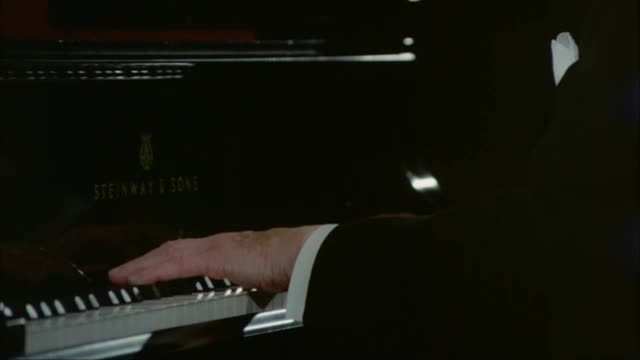
|
CHOPIN, F.: Piano Concerto No. 2 in F minor, Op. 21 (Rubinstein, Previn)
Composer:
Chopin, Fryderyk
Artists:
London Symphony Orchestra -- Previn, Andre -- Rubinstein, Artur
Label/Producer: UNITEL |
| CHOPIN, F.: Scherzo No. 2 in B flat minor (Rubinstein) | |
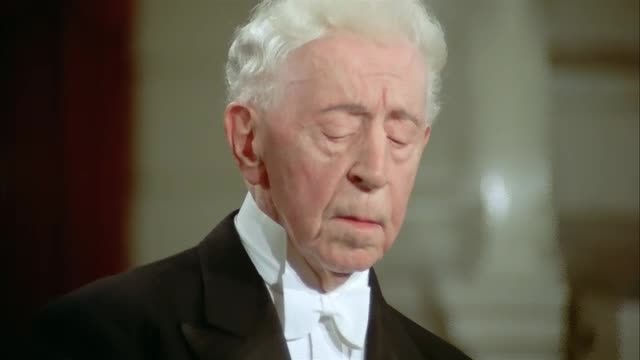
|
CHOPIN, F.: Scherzo No. 2 in B flat minor (Rubinstein)
Composer:
Chopin, Fryderyk
Artist:
Rubinstein, Artur
Label/Producer: UNITEL |
| GRIEG, E.: Piano Concerto in A minor, Op. 16 (Rubinstein, Previn) | |
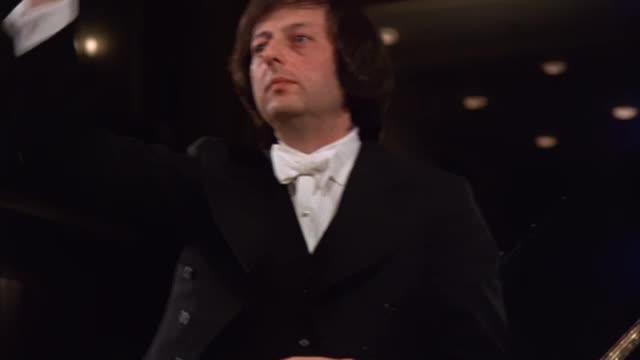
|
GRIEG, E.: Piano Concerto in A minor, Op. 16 (Rubinstein, Previn)
Composer:
Grieg, Edvard
Artists:
London Symphony Orchestra -- Previn, Andre -- Rubinstein, Artur
Label/Producer: UNITEL |
